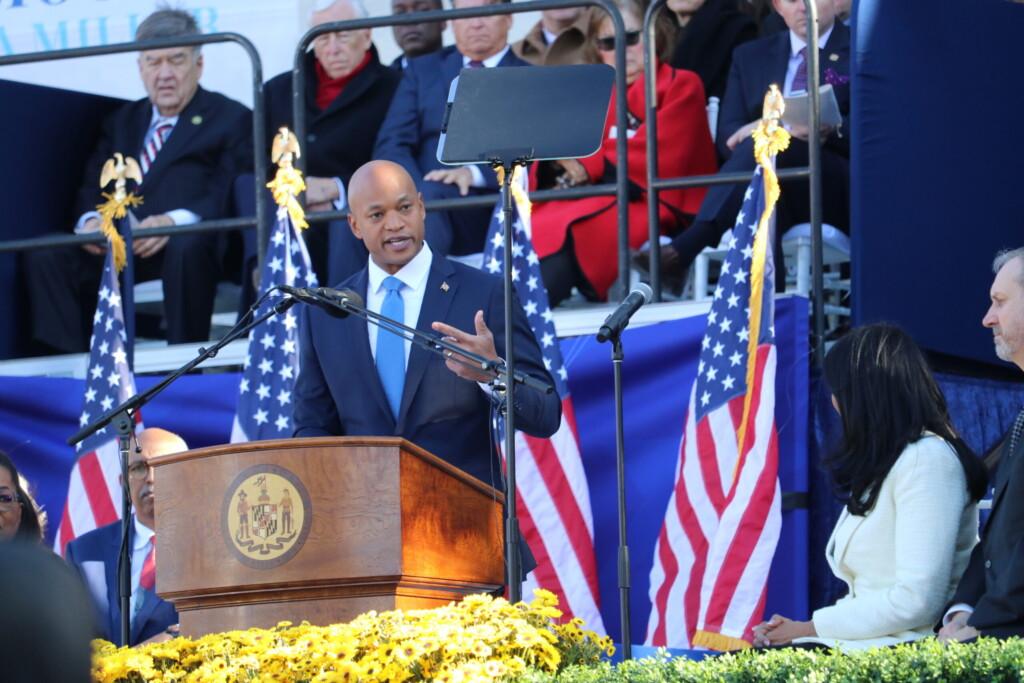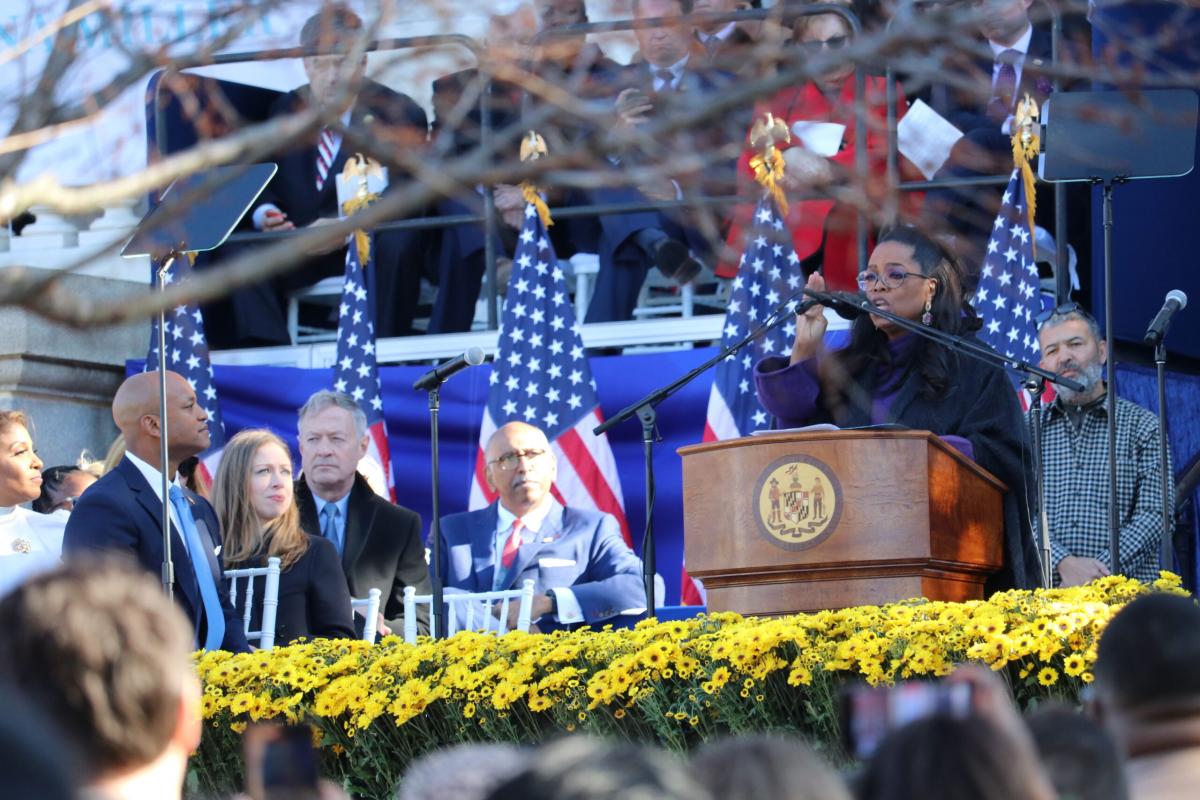
Gov. Wes Moore (D) delivered his inaugural address as Maryland’s 63rd governor — and the state’s first Black chief executive — on Wednesday, pledging to throw open the doors of opportunity to all. Photo by Danielle E. Gaines.
Wes Moore became the 63rd governor of Maryland — and the state’s first Black chief executive — on Wednesday, pledging to throw open the doors of opportunity to all.
In remarks offered soon after he was sworn in, Moore acknowledged the inescapable significance of the moment.
“As we stand here today, looking out over Lawyers’ Mall, and you can see right there the memorial to Justice Thurgood Marshall, it’s impossible not to think about our past and our path,” he said.
“We’re blocks away from the Annapolis docks, where so many enslaved people arrived in this country against their will. And we are standing in front of a capitol that was built by their hands.”
Moore’s inaugural remarks, delivered on the north side of Maryland’s historic State House in Annapolis, reprised several themes he invoked during his successful campaign, including his view that the state is “asset-rich and strategy-poor.” Going forward, Moore promised, Maryland will leave no one behind.
The new governor said the state will cast aside the “false choices” that are commonplace in modern policy debates.
“We do not have to choose between a competitive economy and an equitable one,” he said. “Maryland should not be 43rd in unemployment or 44th in the cost of doing business. We should not tolerate an 8-to-1 racial wealth gap, not because it only hurts certain groups, but because it prevents all of us from reaching our full potential.”
Ad-libbing heavily throughout his text, Moore pledged to put Maryland on course to “generate 100% clean energy by 2035,” and he called climate change “an existential threat for our entire state.”
He also pledged to offer a service year option for all high school graduates, saying, “My years of service transformed me. … I want every young Marylander, of every background and from every community, to have the opportunity to serve our state.”
Moore took the oath twice. He officially became governor at 12:08 p.m., when he was sworn in by Chief Justice Matthew Fader in the Maryland Senate chamber. Moore’s left hand rested on two Bibles, including one used by abolitionist Frederick Douglass. The other was from his grandfather, the Rev. James Thomas, the first Black minister in the history of the Dutch Reformed Church.
Turning toward the chamber, he pumped his fists in the air and hugged his children James and Mia, hugged his mother, Joy, and kissed his wife, Dawn.
More than an hour later, at 1:21 p.m., Moore and Fader re-enacted the oath-taking outside for the benefit of the large crowd that had gathered, under sunny skies, on and beyond Lawyers’ Mall.
The crowd cheered enthusiastically and the Maryland Air National Guard 104th Fighter Squadron conducted a flyover while a 19-gun salute could be heard in the distance.
The 44-year-old Democrat, born Westley Watende Omari Moore in Takoma Park and raised largely in New York, spoke for 20 minutes. The charismatic political newcomer — a winner in his first campaign — crafted most of his inaugural address himself, spending the last few weeks tweaking his remarks.
During his 17-month campaign, Moore largely sidestepped questions about his potential role in history. But he began his day on Wednesday with a wreath-laying ceremony at the Kunta Kinte-Alex Haley Memorial in downtown Annapolis, where he paid tribute to the former slave and the author who made his story of suffering famous.
With the Maryland General Assembly already in session, Moore’s inaugural speech stuck to broad themes. He is expected to unveil at least some of his key legislative priorities in the next few days.
Moore’s path to the governorship was unusual, running through successful stints as a Rhodes Scholar, Army paratrooper, investment banker and non-profit executive. So too was his inaugural. Among the boldface names in attendance: Oprah Winfrey, Chelsea Clinton, former U.S. Attorney General Eric Holder, former Massachusetts Gov. Deval Patrick, and more.
Winfrey, who got her start as a 22-year-old news anchor at WJZ-TV in Baltimore, introduced Moore before his remarks and praised him at length. Winfrey said every conversation she’s ever had with Moore is “memorable” for his ability to inspire.

Oprah Winfrey introduced Gov. Wes Moore (D) during inaugural festivities in Annapolis on Wednesday. “I know that, with Wes Moore as your governor, Maryland’s best days lie ahead,” she said. Photo by Danielle E. Gaines.
Aruna Miller (D), who made history herself as the first woman of color to be elected lieutenant governor, took her oath of office just before Moore, using a copy of the Bhagavad Gita, the revered Hindu text.
Miller was introduced by her adult daughters, Meena, Chloe and Sasha. Meena Miller said she was motivated to become a public school teacher because of her mother’s commitment to public service. “I move through the world the way that I do because of her,” she said. “She leads with values. She says ‘yes’ when it matters most, and that is how she will serve the people.”
The new governor has pledged to give Miller, a longtime transportation engineer who worked for Montgomery County government, a significant portfolio.
Former Gov. Larry Hogan (R) attended the inaugural festivities. Moore thanked Hogan for his service to the state and for his assistance during what appeared to be a drama-free transition.
The Moore-Miller ceremonies capped a swirl of history-making and barrier-shattering events unprecedented in Maryland’s history. They also represented a significant generational shift in state leadership.
On Jan. 3, 61-year-old Anthony Brown (D), a former congressman and lieutenant governor, became the state’s first-ever Black attorney general, replacing 76-year-old Brian Frosh (D). On Monday, Comptroller Brooke Lierman (D), a former state delegate from Baltimore City, became the first woman to serve as the state’s chief tax collector. The 43-year-old Lierman, took the post held for 16 years by 75-year-old Peter Franchot (D).
During a brief interview, former lieutenant governor Michael Steele (R) said Maryland could be an example for other states to follow when it comes to electing more Black officials to statewide positions.
“When I stepped into that space, I looked around there weren’t a whole lot of folks that I could look at and see myself reflected, but that’s not the case today,” he said after greeting D.C. Mayor Muriel Bowser. “I think that’s part of the blessing that we get to experience right now is that not only we made progress, but we’ve made good progress, and maybe committed a little good trouble along the way.”
Military presence
Moore’s military service, as an Army captain in Afghanistan with the 82nd Airborne Division, was a key feature of the inaugural ceremony.
Before Winfrey’s introduction of the governor, Retired Lt. Col. Jaime Martinez, Moore’s commanding officer in Afghanistan, delivered remarks.
Martinez called Moore “the very best of us” and said he embodied the Army value of “selfless service.”
“Wes has called on every Marylander to serve and support one another — to leave no one behind. He has made this call because he has lived these values himself,” Martinez said. “In Afghanistan I saw a leader emerge from the most difficult challenges. And I see that same leader here today.”
For his part, Moore said he would build coalitions as governor and noted that there was one question he never asked fellow soldiers: “What’s your political party?”
Freddie Roberts, a 20-year Army veteran, wore a black U.S. Army jacket as he watched Moore’s speech on a large screen television outside Lawyers’ Mall.
Roberts recalled meeting Moore in October, when the now-governor was celebrating his birthday in Roberts’ hometown of Pocomoke City.
“He let me come and shake his hand. Saluted me,” Roberts, 63, said while laughing. “The first thing he said to me, ‘I don’t forget where I come from.’ He was real cool. I support him.”
Another Army veteran, Swain Riley of Columbia, served in that branch for 26 years. He’s also a member of Moore’s fraternity: Alpha Phi Alpha Fraternity Inc.
“It’s three-fold for me: a veteran, a Black man and a member of Alpha Phi Alpha Fraternity Inc. We support each other,” said Riley, who moved to Maryland three years ago from East Orange, New Jersey. “I read the book, ‘The Other Wes Moore.’ There was so much power in it and the words of wisdom…to continue service,” Riley said. “I see great things for brother Moore.”
Witnessing history
Thousands of Marylanders converged on downtown Annapolis to witness Wednesday’s historic inauguration, even though some were hundreds of yards away looking at the ceremony on large television screens.
Betty Clark of Baltimore City said she followed Moore’s career when he released his book, “The Other Wes Moore,” more than 10 years ago.
Clark, a retired Baltimore teacher who serves as vice chair on the board for the Baltimore Design School, invited Moore to speak with some of the students and he came.
“He’s a positive influence and I wanted to [show] that before young people,” she said sitting on a bench beside the House of Delegates building. “He tells his life story…on how his life could’ve went a different path. We can [tell] our young and people and say, ‘Your mistakes don’t determine the determination.’ You can rise above that. [Moore] has.”
After the ceremony, hundreds lined up to walk inside the State House to greet and take a picture with Moore, Miller and their spouses.
Tiangay Waines of Randallstown took photos of her 7-year-old son, Diego, with Moore and Miller.
Waines, an accountant for Baltimore City, agreed with Moore’s message about bipartisanship “to get the work done for Marylanders.”
By midday Wednesday roadside signs in Maryland already bore a new name and new slogan welcoming visitors to the state. State Highway Administration photo.
“This has been really great week. We went to the Martin Luther King parade on Monday in Baltimore City and now today,” said Waines. “This is just a great day.”
Out with the old, in with the new…
As Moore was being inaugurated, crews from the State Highway Administration were hard at work, placing overlays on 22 welcome signs around Maryland to change the name of the governor and his slogan. The Maryland Transportation Authority placed overlays on two additional signs.
Since William Donald Schaefer was governor, every state executive has put a slogan of his choosing on the Welcome to Maryland signs. Former Gov. Larry Hogan’s slogan was “We’re open for business,” but his name and message disappeared Wednesday when highway crews placed the sign overlays with Gov. Wes Moore’s name and his new slogan: “Leave No One Behind.”
By Bruce DePuyt, William J. Ford, William F. Zorzi, Danielle E. Gaines



Write a Letter to the Editor on this Article
We encourage readers to offer their point of view on this article by submitting the following form. Editing is sometimes necessary and is done at the discretion of the editorial staff.